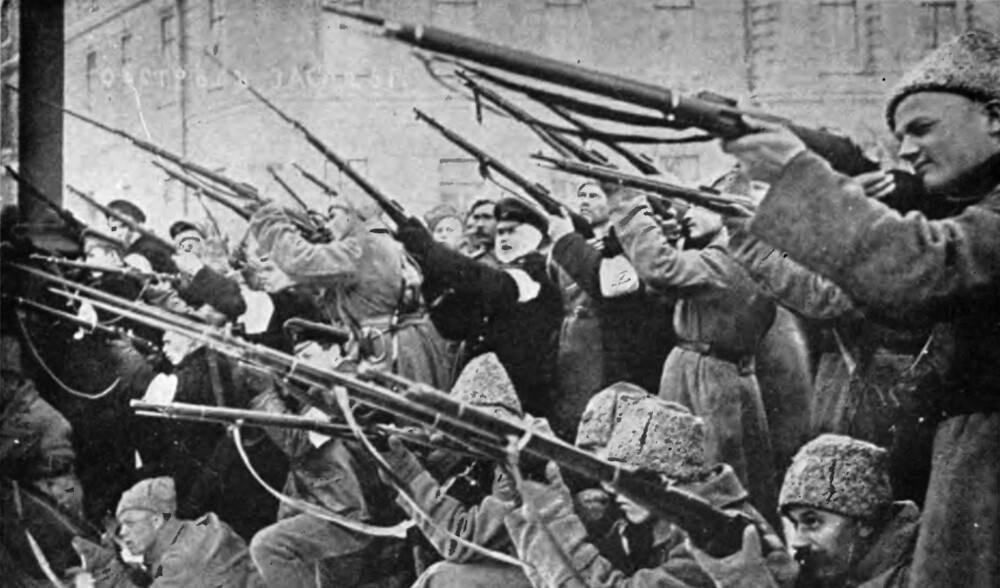The Polar Bears: The Americans Who Fought (Their Allies) Russia In WW1

Even if we're more familiar with the bigger, more successful sequel, we all have a basic idea of what America did during World War I, right? America got pissed with Germany, sent some men and dough over there, and thrashed the Kaiser so hard his mustache ran away. However, there’s one part of the war few of us remember: when Woodrow Wilson sent a bunch of dudes from Michigan to fight the Russians. The Russians, who were on the same side as the US and other Allied Powers.
Confused? Good, you should be! Here's what happened.
It Began In A Winter Wonderland (Of Machine Guns)
Don't Miss
Officially, the United States entered the First World War "to make the world safe for democracy." But there was one glaring problem with this idea: one of the Allied powers, Russia, had a terrible, incompetent, decidedly un-democratic leader in Tsar Nicholas II. He spent the majority of his time being a doting father, being pals with Rasputin, and, uh, ruthlessly crushing his people in an authoritarian grip.

via Wiki Commons
But democracy or no, the Allies needed Russia. With Russia there, Germany was stuck in a two-front war, which was vital in keeping the German war machine from absolutely wrecking France and Britain. The Russians fielded an army of 15 million men throughout the course of the war. And though the quantity didn’t have the quality necessary to beat Germany, the armies of the Russian Empire were still valuable.
That’s why, after years of being a German punching bag, when the Russians did a revolution in 1917 (well, they actually did two, but who’s counting), the Allied powers fell into a frenzy of terrified harrumphing and monocle-clutching. By this point in the war, the Allies were providing a ton of supplies—shells, guns, and we presume liberty cabbage—to prop up a Russian empire that was nowhere near as industrial as the rest of the Allies. And now, not only were those guns and shells decidedly not being used to blow Germans to smithereens, they were set to support the revolutionaries who'd overthrown the Romanovs.

The Allies thought sending in a bunch of troops would help (it worked at Verdun, right?), and the United States wanted in. But Americans weren’t yet the world police they became after the Second World War. At home, there was a strong undercurrent of thought that Americans "shouldn’t go abroad in search of monsters to destroy" and should avoid entanglements in foreign conflicts.
And so was born the American Northern Russia Expeditionary Force (ANREF) and the American Expeditionary Force in Siberia (AEF- Siberia), two American armies that would travel to the Russian Empire in the midst of a Soviet revolution … but specifically not to fight the Soviets.
Mission Creep Was Almost Guaranteed
Like many of the world’s strangest ideas, it began in the great state of Michigan.
The military recruited mostly from the Mitten State (don’t test us, Wisconsin) because the top brass figured Michigan is cold, so soldiers from there would probably do well in the Russian winter. You know, the same way growing up in Southern Illinois means you can survive comfortably in Death Valley.

They trained at Camp Custer near Battle Creek in Michigan and even got some advice from polar explorer Ernest Shackleton on how to survive in sub-zero temperatures. In all, 5,000 troops were trained as the 339th Regiment of the United States Army and sent to Archangel, Russia. They gave themselves the nickname "Polar Bears," which is a privilege you get by going to fight in a Russian winter.
Their stated mission was to prevent Allied war materiel held at Archangel and Vladivostok from falling into Soviet hands, and to help the Czechoslovak Legion get the hell out of there. The Czechoslovak Legion was a fighting force of Czech and Slovak POWs who'd volunteered to help the Russians fight the Austro-Hungarians in hopes of creating an independent state. After the Tsar fell, they started fighting for the White Russians against the Bolsheviks, and were slogging their way through Siberia. Like we said, it was a complicated time.

via Wiki Commons
The memo Wilson’s government wrote about the mission specifically said that the Americans would not take sides in "Russian internal affairs" (i.e. the civil war) but in the same breath said they'd aid Russians with their own "self government and self defense," presumably from Baba Yaga and her chicken-footed tanks and not the Red Army.
It doesn’t take a huge leap in logic to see these contradictions. For example, say the Czechoslovak Legion was fighting the Red Army. The Americans were, quote, "... only to help the Czecho-Slovaks consolidate their forces and get into successful cooperation with their Slavic kinsmen." The people preventing them from doing that were the Red Army. So, wouldn’t that put the Americans in conflict with, you know, the Red Army? Hell, what if those silly Bolsheviks saw the Allies landing a huge army on Russian shores and, we dunno, started firing at them, as armies are wont to do?

via Wiki Commons
To make things even more complicated, Archangel and Vladivastok, the two cities whose goods they were supposed to secure? They're 4,000 miles away from each other.
What followed went about as well as walking on eggshells loaded with dynamite. That's not just us coming up with crazy metaphors: That's also word-for-word what the Secretary of War warned the situation would be like.
Defending Supplies Turned Into A Fight For Survival
The first reason that "never get involved in a land war in Asia" is the best advice (up there with "know thyself" and "delete your Twitter account") is that you have to get there. ANREF had to go by ship, and over months at sea, the 339th lost 30 men to Spanish Flu, a disease that would later fill their hospitals.

USS Tenadores
The second reason you don’t get involved in a land war in Asia is the weather. One soldier knew they were in trouble because they were issued long underwear … in August. Temperature in the dead of a Russian winter fell to negative 56 degrees Fahrenheit. It’s hard enough to just exist in that kind of weather, let alone do the work of war.
Aside from the obvious problems, by the time the Americans arrived, two quite disappointing facts (among many) came to light: the Soviets had already looted the cache of weapons at Archangel, and the Czech Legion didn’t really need our help, having wiped the floor with the Red Army and seized the gold reserves of the Tsar for their trouble. And while the Americans were still kind of new at this whole "enter the graveyards of empires and start shooting" thing, the British and French were particularly experienced in that sort of fighting. They took to fighting the Red Army like a snow-duck to snow-water, trying to recruit an army around the Czech Legion to help the White Russians fight the Reds and reopen the Eastern Front against the Germans.
Contradicting Wilson’s (contradictive) directives, the American forces that fell under British control fought a six-week offensive against the Red Army along the River Dvina in Northern Russia, trying to capture a vital rail junction for the arriving Czechs. They soon found themselves defending thousands of miles of railway, all of which had to be supplied by train, horse, boat, and reindeer.

In the east, the Americans not only had to deal with fighting the Red Army and trying to support the Czech Legion, but they had to constantly scrap with Allied generals wanting to draw America deeper into the Russian Civil War. Those included the Japanese, who were itching to take a little bit more of Asia for their fledgling empire. In one incident, a (drunk) Japanese officer struck an American sentry named Smith with his canteen strap. The American responded by *checks notes* bayoneting the Japanese officer in the neck. The Japanese officers wanted to kill Smith for his crimes. An American major came to his defense and said, “If you want a war, you can have it.”

They Withdrew After (Alleged) Mutiny
As the war in Russia dragged on, the Americans were bogged down trying to guard railways, fight communists, and generally not freeze to death. But in November 1918, the German lines on the Western Front collapsed. The Kaiser abdicated, and the Germans reorganized their government along democratic lines. Peace was declared on November 11, 1918. Everybody was set to go home, throwing their helmets into the air like steel Frisbees of joy.

But the Americans stuck around in Russia, and the war there didn’t stop. It continued to not stop well into the next year. There were a few different reasons for this, only one of them being that Woodrow Wilson wanted to wait and see which of the Russian governments vying for control would actually take the country. There was also the small matter of Archangel’s port being frozen. But those reasons weren't good enough for the people stuck doing the fighting.
By March 1919, one company had signed an antiwar petition, and another had an (alleged) outright mutiny on its hands. The penalty for mutiny in the US military is, you know, death, so that’s a pretty big deal. The mutiny episode was explained by a "soldier who couldn’t understand English well," even though the Midwest is the gold standard for American English.
ANREF wouldn’t leave Russia until May 1919, a full four months after the ceasefire on the Western Front. The soldiers in Siberia? They wouldn’t totally leave until April 1920.
They Had To Return To Retrieve The Dead
Even with the evacuation, half the dead U.S. soldiers were stuck in the Northern Russian wastes. Between the miserable conditions and the constant warring with the Red Army, bringing all those bodies home was no easy feat.
Right at the end of the decade, in 1929, five of the Polar Bears returned to Russia to retrieve the bodies of their fallen comrades. In the end, the remains of 86 soldiers came back to the United States. They were buried in Troy, Michigan, in a circle around a giant marble polar bear:

When the expedition to Russia started, the US thought that soldiers in Russia would fight a "harmless little war," some young men would presumably get some stories to tell around a campfire, and everybody would go home happy. Hundreds died in the fighting, and by the time the US had left Russia completely in 1920—only after intense lobbying from soldiers' families, government inquiries, and giant rallies in Grand Rapids and Detroit—they'd accomplished none of their goals, because the goals weren’t very well defined to begin with.
From then on, every American was taught not to get involved in a land war in Asia and always to have a clear mission whenever you’re sending the military anywhere. That’s why America happily avoided … wait. Aw, nuts.
Steven Assarian is a librarian. He writes stuff here.
Top image: Bolandera/Wiki Commons
